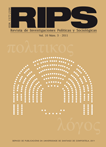Vol. 11 Núm. 4 (2012), Artículos
Recibido: 07-01-2013
Aceptado: 07-01-2013
This article examines the evolution of the al-Harakat Muqawima al-Islamiya (Hamas) movement, operating, as it were, a statelet in the Gaza Strip based on the principles of ‘Tangentopoli (bribesville).’ Hamas shifted from being on the political fringe to Palestine’s prime political resistance movement and now has come to be regarded as a trans-national criminal group. However, the process of transforming from an illegitimate “terrorist” or a legitimate “resistance” group (depending on individual sympathies) actually encouraged it to embark on criminal activities much beyond common corruption or policy excesses that often accompany combatant-justice. Instead, many of the interests currently pursued by Hamas are narrowly defined in terms of maintaining its own economic and military power rather than the establishment of a free and prosperous Palestine. This work applies common sense theory to both the evolution of governance in Palestine (re: Israel, the PLO, Hamas) and Hamas itself, as it is growing increasingly clear that Palestine’s and Hamas’ interests starkly contrast. Such theoretical ‘musings’ spills over to the empirical crutches this work relies on as the work deploys primary information (semi-structured) interviews as well as secondary information to assess the validity of each hypothesis. This work then concludes with a post-factum analysis.
Hamas, Palestine, Israel, international criminality, common sense theory, Tangentopoli


